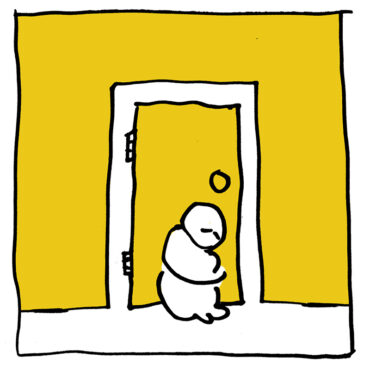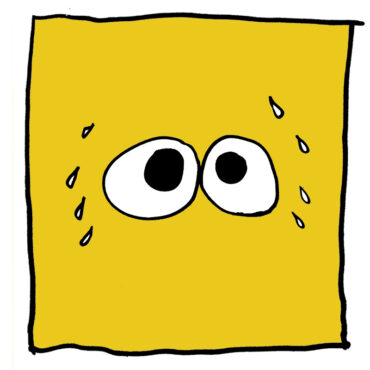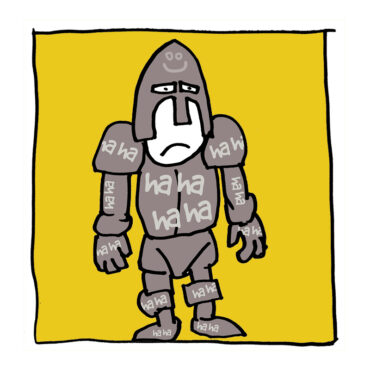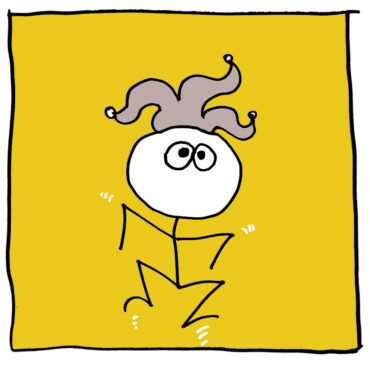
It was only when I had found a safe, supportive relationship that I could start to face some of my deeper, hidden emotional issues.
One of these was my mixed feelings about my family. I had avoided being aware of this for decades, but when I took my new girlfriend to a family get together it was impossible to avoid noticing that something was wrong. I was used to feeling uncomfortable at family get togethers; when I attended one with my new girlfriend I saw things with fresh eyes. I started to wonder why I was so uncomfortable around my own family.
What woke me up was when a younger family member actually asked a serious question about a distant relative who was having a hard time.
In different circumstances it might have been the start of a genuine conversation about someone we all knew. Here, around the family meal table, all that question received in reply was a lot of bad jokes and one-liners.
It was just the way my family was, the way we had always been; making fun of things like that and laughing away together harmlessly. But today I saw it and it looked anything but harmless.
As a group we had just successfully avoided expressing something of emotional significance, and all done unconsciously.
Something that hinted at vulnerability had been cut down with silly, sarcastic, child-like voices. As things calmed down I realised all the adults had just fallen into their old childhood roles. It was just like being around the dinner table as a kid again where any disturbing talk of emotions was banished. In my family no one ever mentioned emotions; and no one ever would. We all knew that.
As a group we had a bizarre collective agreement that emotions simply did not exist. They were rarely acknowledged and never welcomed. Even intense displays of delight were somehow suspicious, as if they would tempt us into displaying other, less welcome things. Emotions had the stink of sin about them in our house.
If someone displayed emotions it was embarrassing. Anyone showing anger was simply ignored and to be visibly upset about something was just inviting ridicule. In my family emotions were handled behind closed bedroom doors or by going out into the huge backyard and kicking the dog. As a child I hadn’t been trained or advised about emotions, of course, I just absorbed the behaviour of the people around me, as children do.
Strong displays of emotion were rare and treated much like the arrival of a loud fart.
Everyone else would either giggle or roll their eyes while the upset party ran away to hide behind a bedroom door for a while. Everyone in my family spent time hiding behind their bedroom door, and I never spoke to anyone about it. I wonder if any of them did?
Of course we had to interact with people outside the family who, shockingly, spoke openly about emotions to each other and even to us! Of course then we were obliged to acknowledge to outsiders that emotions existed; but when we came back into each the family orbit our conditioning kicked in and we were back in our parents’ world of ‘emotions don’t exist’.
‘Emotions don’t exist.’ If I did feel something bad inside me that meant there was something wrong with me. It was better to simply ignore all these silly emotions and ‘just get on with it’ and do as we were told. Otherwise God might condemn us to hell.
The priests kept telling us we were sinners all the time, and they should know.

As attitudes go this is ridiculously toxic and unhealthy. But we were Catholics; believing in stupid, evil things was what we were good at. For instance I had been trained to believe that there was an all loving God who was quite prepared to send me to hell for ever if I infringed some pretty petty dietary rules. ‘I’m going to burn in eternal damnation if I eat a steak on a Friday?’ I would wonder to myself, and of course the answer was yes. Apparently my only hope was to regularly grovel for mercy and give donations to the priests, the ones who stood guard at the gates of Heaven and kept out the riff raff; Yahweh’s bouncers.
After being told to believe all that nonsense it wasn’t hard to believe in madness like ‘emotions don’t exist’. So my family collectively ignored emotions and instead told ourselves that ‘we’re ok’ and ‘just get on with it’. There was nothing in Catholic theology about being emotionally engaged with your children and so my parents, provided they kept the regular donations up, were still guaranteed free entry to Paradise when the last trumpet sounded.
My parents of course had grown up in their own emotionally dysfunctional homes; maybe they thought they were doing alright by their kids. There’s no way to know because we never talked about stuff like that. And because we never spoke about it their toxic habits were reproduced in my childhood home.
My emotionally immature parents modelled ignoring emotions and so that’s what their children learned to do.
Except children don’t have adult restraint; they push things to extremes, making a competitive game out of mimicking adult behaviour. I was the youngest of four so by the time I came along the parent’s model of dysfunctional behaviour now had a chorus line of older children who amplified the message of emotional suppression. My eldest brother mimicked my father’s oblivious refusal to acknowledge emotions at all. That wasn’t so bad. The other two siblings, however, adopted my mother’s sarcasm but without any sense of adult restraint. They used to harass me till I broke down in tears.
It became a contest, a competition between them and they urged each other on. My Mum tried to rein them in but she had four children to look after and a husband who just didn’t care about me that much. If she stirred him up he’d stop the others but kids can read their caregivers like a book and my two elder siblings pretty much did what they wanted, knowing the father wouldn’t do anything much. So as well as hostile presence of my siblings grinding down my self-esteem I had a cold absence of a caring father.
They hurt me so much that I learnt to not feel anything. Living with my tormentors meant I was always open to attack and had to be ready to defend myself at a moment’s notice. It gave me a hyper-vigilance that I never lost, as well as a lifetime of sleeping extremely lightly. No child is going to stay open to life under those circumstances, particularly when that’s all the family I had. The only other ‘family’ was a horrible grandma we all hated visiting (even her daughter, my mother), a pair of Uncles and a few cousins who we saw once or twice a year. My family was my emotional world and under all that pressure I became a black hole.
I learnt to appear confident and calm, even when I was scared or unsure, because I grew up with sharks and vulnerability was like blood in the water for them.

I quickly learnt to lie about how I felt. I learnt to mask my feelings and not show signs of distress. Despite all this I was still terrified of them getting under my armour and finding a soft spot they could torment me with. This wasn’t paranoia, this was the lesson of countless ambushes and relentless teasing. I couldn’t relax whenever my family was around, unless it was just Mum and me on our own.
Kids sometime deal with trauma by turning it into a game and I turned the bizarre emotional shortcomings of my family into a game that I played to keep them away from me. As a family we dealt with powerful and painful emotions by just trying not to be around when they showed up, like dodgy bogans avoiding a debt collector. I learnt very early on the power of laughter as a distraction from painful feelings. It worked for me and I discovered others appreciated me distracting them as well. So I became good at distracting myself and others from the sort of things my parents didn’t want to talk about. Feelings and talk of intimacy or sensitivity were all part of the collection of forbidden things. I became very good at ridiculing emotional expression with humour and sabotaging attempts at meaningful connection.
And that’s how I learnt to deal with my emotions: make a joke out of it and the pain disappears.
Occasionally things became too much for a joke and I’d go and hide behind my bedroom door and cry for a while. Eventually I would return and start being funny again. After a while I just became ‘the funny one’.
I learned how to make people laugh. Humour is like most other things; if you practice it enough you’ll become good at it. I had a very strong incentive to practice and between my mother and the TV I had enough role models to figure out how to be funny. My early humour was all about gaining the attention of the caregiver and gaining that protective umbrella from the monsters. If I was being hassled by my brutish brother I would go find Mum and start amusing her, and for the duration of her attention I knew I was safe.

Humour for me didn’t begin as sharing laughter, it began as psychological self defence in the snakepit of family life. Over time I learnt how to stop the older siblings from hurting me by making them laugh. Then I learned that when I made fun of my eldest brother the second eldest would join in with me! Suddenly my bully wasn’t hurting me, now there was a bizarre camraderie between us by teaming up against someone else. This was so much better than me being the one teased, so I learned how to be the cheerleader for the bullies rather that their victim.
I had found my role within the twisted family dynamic and I worked hard to be as funny, without being vulnerable, as I possibly could be.
I did it so well that I soon forgot there could be any other way to live. My family’s unacknowledged habits kept me ruthlessly suppressing awkward feelings for decades and mocking the very idea of being so foolish as to express emotions. Why would anyone want to do that?
It was only when I took Kerry to meet them that I saw the family dynamic with fresh eyes. Very quickly I realised like there was something very wrong going on here. The rest of my family was blind to this, as blind as I had been for over 30 years; but now I couldn’t unsee what I had seen.
I remember driving back from that family gathering with Kerry. She had sat through the sort of thing I had heard all my life; the usual conversation about relatives, domestic goings-on and lots of terrible puns and childish humour. As we were driving away she asked me ‘Do they ever do anything apart from tell jokes?’ It was one of those questions that lifted me out of an old point of view and gave me a fresh look at something I hadn’t ever really contemplated. ‘No,’ I said, feeling slightly nervous, ‘No, they don’t do they?’
We talked around that for a bit and then I drove on in silence.
Thank you for reading this extract. What was your reaction to it? If you’re in the mood and want to send me a comment please use the form below.
You can check out my Patreon page.
You can return to the Excerpts Index.
All text and images © The Mindfulness Poet
I found this chapter sad. Family life at its best is a sanctuary, where you can be yourself, surrounded by love, fun, interest, and peace. The very opposite of what you described Brendan, where you had to be alert, unable to relax. We human beings are so good at ‘getting it wrong’.
I found your comments on growing up Catholic amusing and insightful ….. I have frequently mused on the fact of the Christian religion’s symbol being one of the worst forms of painful execution of man by man.
I have every confidence in the success of this book, you have laid yourself open and vulnerable in the telling of your life story, and offered pathways to healing. Many people will be able to relate to their own experiences, and find the book helpful. Well done Brendan ……..♥